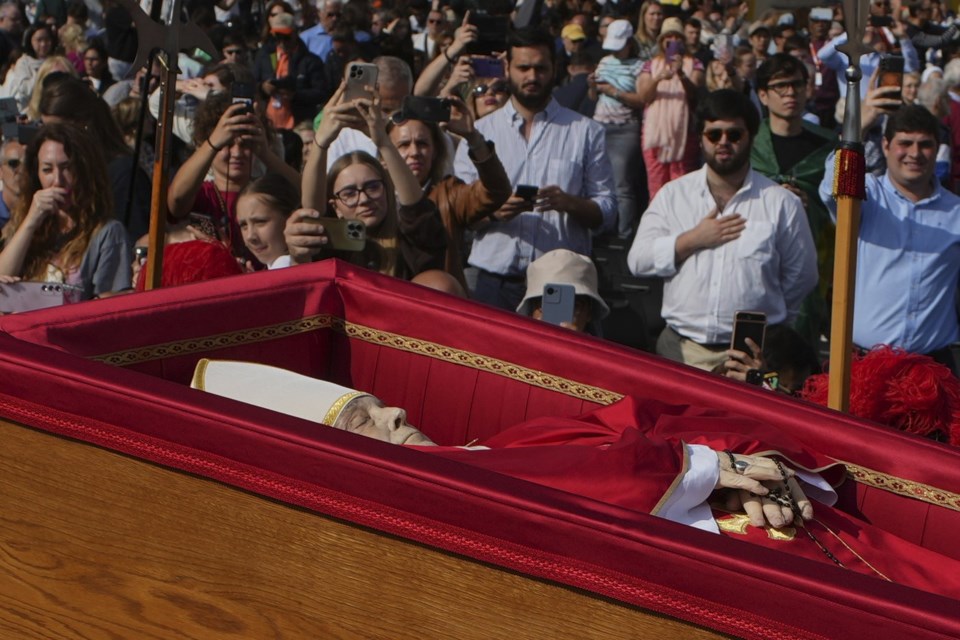VATICAN CITY (AP) — Pope Francis died on Easter Monday at the age of 88 after a papacy of 12 years. Here are the key things to know about the death of the Argentine pontiff, the first from Latin America.
The timing and cause of Pope Francis’ death
Francis died Monday morning at the Domus Santa Marta hotel where he lived at the Vatican. His death came almost a month after he returned there following his treatment in hospital for double pneumonia. The Vatican said Francis died after having a stroke.
Mourning the pontiff
St. Francis has been lying in state in a simple wooden coffin inside St. Peter’s Basilica. He is dressed in red liturgical vestments and his hands are folded, holding a rosary.
Interest in paying respects to him is high. The Vatican kept the doors open all night due to higher-than-expected turnout from mourners across the globe, closing the basilica for just an hour and a half Thursday morning for cleaning.
The basilica was to be kept open until midnight Thursday to allow the faithful to mourn. The public mourning period was scheduled to end on Friday at 7 p.m. (1700 GMT) and the funeral was set for Saturday at 10 a.m. (0800 GMT) in St. Peter's Square.
Heads of state, including U.S. President Donald Trump, are expected for the funeral.
Francis will then be buried, according to his will, in a simple underground tomb at St. Mary Major Basilica, home to his favorite icon of the Virgin Mary, to whom he was particularly devoted.
The pope's recent illness
Francis, who suffered from chronic lung disease and had part of one lung removed as a young man, was admitted to Gemelli hospital in Rome on Feb. 14 for a respiratory crisis that developed into double pneumonia. He spent 38 days there, the longest hospitalization of his papacy.
Those weeks had raised fears that he might soon die or resign as Pope Benedict XVI did in a surprise move that led to the election of Francis in March 2013. But Francis insisted he would stay on in the role, and returned to the Vatican on March 23.
How do they choose a new pope?
After a period of mourning, cardinals will gather to elect the next pope.
The cardinals will vote in secret sessions, and the ballots will be burned in a special stove after each session. Black smoke indicates no pope has been elected, while white smoke says the cardinals have chosen the next head of the Catholic Church.
Any baptized Catholic male is eligible, though only cardinals have been selected since 1378. The winner must receive at least two-thirds of the vote from those cardinals under age 80 and thus eligible to participate.
Francis appointed the vast majority of electors, often tapping men who share his pastoral priorities, which suggests continuity rather than rupture.
While it's impossible to predict who the next pope will be, some cardinals are considered to have better chances than others.
The legacy of Francis
Francis was known for his personal simplicity, from the choice of his name Francis in honor of St. Francis of Assisi, who renounced wealth to help the poor, to the outward symbols and priorities of his papacy.
He chose to live in the Vatican hotel instead of the Apostolic Palace and wore his old orthotic shoes and not the red loafers of the papacy.
In his teachings he focused on concern for refugees and other marginalized people. His first trip outside Rome as pope in 2013 was to the Sicilian island of Lampedusa to meet with newly arrived migrants. His plea for welcome put him at odds with U.S. and European policies.
He also also signaled a more welcoming stance toward LGBTQ+ people, while also making the fight against climate change a priority. Francis became the first pope to use scientific data in a major teaching document and made care for God’s creation a hallmark of his papacy.
He eschewed the grandiose even in his departure, lying in state in a simple coffin made of wood.
His record on Ukraine
Francis tried to maintain the Vatican’s traditional diplomatic neutrality when it came to Ukraine, and that led to criticism for what some called an unclear position on Russia’s invasion of its neighbor.
He at times expressed apparent sympathy with Russia’s rationale for invading Ukraine — like when he said NATO was “barking at Russia’s door” with its eastward enlargement. And last year he called on Ukraine to show the “courage” to negotiate peace.
Legacy on clergy sex abuse
Francis' critics also argued that he failed to bring justice to victims of clergy sex abuse or to bring the needed reforms to the church.
The Women’s Ordination Conference also lamented Francis’ unwillingness to push for the ordination of women. “This made him a complicated, frustrating and sometimes heartbreaking figure for many women," it said.
Vanessa Gera And Nicole Winfield, The Associated Press




